[Printer Version]
A Pictorial History of the
Matt Family Catholic
Journalists
 The oldest traditional Catholic newspaper in the United
States is The Remnant. And, although
The Remnant was founded in 1967, two years
before the New Mass was introduced, this national Catholic bi-weekly newspaper
has as its "parent paper", so to speak, the oldest Catholic weekly newspaper in the United
Stated, The Wanderer.
Though there are serious ideological differences between the two Catholic
newspapers, they are to this day run by the same family—the Matt Family.
Alphonse Matt, Jr., the current Editor of
The Wanderer, and Michael J. Matt, the
current Editor of
The Remnant, are first cousins.
The oldest traditional Catholic newspaper in the United
States is The Remnant. And, although
The Remnant was founded in 1967, two years
before the New Mass was introduced, this national Catholic bi-weekly newspaper
has as its "parent paper", so to speak, the oldest Catholic weekly newspaper in the United
Stated, The Wanderer.
Though there are serious ideological differences between the two Catholic
newspapers, they are to this day run by the same family—the Matt Family.
Alphonse Matt, Jr., the current Editor of
The Wanderer, and Michael J. Matt, the
current Editor of
The Remnant, are first cousins.
It is impossible to discuss the history of
The Remnant without
tracing the roots of its founding editor, Walter Matt, who for more than thirty
years was an editor of The Wanderer and who left that paper in 1967 to found
The
Remnant. In a very real sense, then, the history of
The Remnant starts in 1867,
when the Matt Family’s journalistic legacy began in this country…a legacy which
continues to the present day.
Hugo Klapproth
1848-1919
Editor of Der Wanderer
 In
1867, Der
Wanderer was founded by two Benedictine monks then serving the
Assumption Church in St Paul, Minnesota. In the wake of the political
revolutions in Germany in the late 1840s, the dangerous new ideas of the German
“enlightenment” had been growing in popularity and influence among German
Catholics, even German immigrants living in the United States.
In
1867, Der
Wanderer was founded by two Benedictine monks then serving the
Assumption Church in St Paul, Minnesota. In the wake of the political
revolutions in Germany in the late 1840s, the dangerous new ideas of the German
“enlightenment” had been growing in popularity and influence among German
Catholics, even German immigrants living in the United States.
This influence was rooted in the anti-Catholic, Masonic juggernaut that
ultimately would help give rise to Hitlerism itself in Germany. These two monks,
in trying to counteract this influence, founded a newspaper,
Der Wanderer, to help educate
German immigrants, not only in their German Catholic heritage, but also in the
dangers of Masonry’s anti-Catholic agenda.
After two years of editing
Der Wanderer, they felt the need to
bring in a professional editor so that they might devote themselves totally to
their priestly duties. Their choice for a replacement was Hugo Klapproth.
Hugo Klapproth was born in Zellerfield, Germany on August 29, 1848. He had
emigrated from Germany and settled in Kentucky before moving his family to
Wisconsin where he worked as editor of the Milwaukee
Germania, a Lutheran daily. For
many years he’d been a practicing Lutheran and a respected member of the
Missouri Synod Lutheran Church.
 At that time a scholarly historian in Germany, Johannes
Janssen, a Jesuit priest, had written a four-volume work on the history of the
Reformation and its disastrous effects on the Church in Germany. It naturally
dealt in great detail with Luther himself, a heretic and apostate priest. The
work’s influence was being felt in many quarters, and the Lutheran establishment
was anxious to disprove the accusations leveled against Luther therein. The man
they felt most qualified to refute the scholarly work was Hugo Klapproth. When
asked to accept the challenge, Mr. Klapproth gladly accepted.
At that time a scholarly historian in Germany, Johannes
Janssen, a Jesuit priest, had written a four-volume work on the history of the
Reformation and its disastrous effects on the Church in Germany. It naturally
dealt in great detail with Luther himself, a heretic and apostate priest. The
work’s influence was being felt in many quarters, and the Lutheran establishment
was anxious to disprove the accusations leveled against Luther therein. The man
they felt most qualified to refute the scholarly work was Hugo Klapproth. When
asked to accept the challenge, Mr. Klapproth gladly accepted.
However, during the course of his study, which had as its end
the refutation of the Catholic priest’s thesis, Klapproth began to realize more
and more that Father Janssen was absolutely correct in all of his findings
against Luther and that the Lutheran Church was an affront to Christ’s true
Church.
The result was that Mr. Klapproth announced to his superiors that they
would have to find another man for the job of refuting Father Janssen as he had
to concur with the priest’s impeccable logic and well-grounded arguments.
He
also announced that he and his entire family were converting to the Catholic
Church. Der
Wanderer had thus found its new editor.
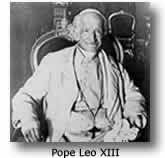 Klapproth moved to St. Paul and took over as editor of that
publication. This was at the time when the heresy of Americanism was taking root
under the tutelage of the likes of Archbishop John Ireland. It would become so
rampant in the United States soon thereafter, in fact, that, in 1899, Pope Leo
XIII promulgated his monumental encyclical against it,
Testem Benevolentiae
Nostrae, Concerning New Opinions, Virtue, Nature and Grace, with regard to
Americanism, which condemned the movement and reprimanded the men promoting it
(e.g., Archbishop Ireland and Cardinal Gibbons).
Klapproth moved to St. Paul and took over as editor of that
publication. This was at the time when the heresy of Americanism was taking root
under the tutelage of the likes of Archbishop John Ireland. It would become so
rampant in the United States soon thereafter, in fact, that, in 1899, Pope Leo
XIII promulgated his monumental encyclical against it,
Testem Benevolentiae
Nostrae, Concerning New Opinions, Virtue, Nature and Grace, with regard to
Americanism, which condemned the movement and reprimanded the men promoting it
(e.g., Archbishop Ireland and Cardinal Gibbons).
After several years of faithful service to
Der
Wanderer, Mr. Klapproth decided that he needed a younger assistant
to keep up with the rapid growth of his weekly newspaper. A young reporter in
the East by the name of Joseph Matt was beginning to make a name for himself at
the time with outspoken, hard-hitting editorials. Joseph Matt’s strong Catholic
approach to the problems of the day drew the attention of Hugo Klapproth. He
invited this young reporter to join him at
Der Wanderer. The young immigrant
accepted the invitation and, in 1897, Joseph Matt came to St. Paul. Thus
commenced what would be life-long service to the Catholic Press Apostolate.
In 1899, after many years of service, Mr. Klapproth was
forced by ill health to return to his beloved Germany, leaving his future son-in-law
Joseph Matt behind to take his place as editor. Joseph returned briefly to
Germany that same year in order to wed Hugo Klapproth’s daughter, Marie. That
union produced six children, the youngest of whom was Walter who was destined to
become editor of The Wanderer and founder of The Remnant.
Hugo Klapproth died in Lucerne, Switzerland, on September 3,
1919. He related the history of his conversion in a splendid volume titled
Briefe an einen protestantischen Freund
(Letters to a Protestant Friend)
Joseph Matt, KSG
1877-1966
Editor,
Der Wanderer/The Wanderer
Joseph Matt was born on October 16, 1877 in Kirrweiler, Germany. He came to this
country at the age of 17.
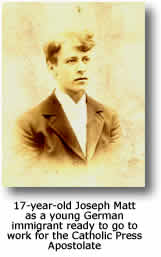 On
arriving in America in 1895, with very little money and a great desire to write,
he earned a scholarship to Canisius College. After his graduation, he took a job
as a reporter for several German Catholic daily newspapers, first in Buffalo,
New York, and later in Pittsburgh. He quickly distinguished himself as a
no-nonsense journalist. He entitled his column “Spruhfeuer”, in fact, which
loosely translates as “let the sparks fly where they will.”
On
arriving in America in 1895, with very little money and a great desire to write,
he earned a scholarship to Canisius College. After his graduation, he took a job
as a reporter for several German Catholic daily newspapers, first in Buffalo,
New York, and later in Pittsburgh. He quickly distinguished himself as a
no-nonsense journalist. He entitled his column “Spruhfeuer”, in fact, which
loosely translates as “let the sparks fly where they will.”
His hard-hitting style drew the attention of Hugo Klapproth, the editor of
Der
Wanderer in St. Paul, Minnesota. When invited by Mr. Klapproth in 1897 to join
his staff, he gladly accepted, journeyed to St. Paul and began his long career
as a Catholic journalist and editor. After 65 years in harness as editor of the
weekly magazine (one of the longest in U.S. history), he was honored by the
Catholic Press Association as the Catholic Editor Emeritus in America.
 During these 65 years Joseph Matt dealt with many issues of import, not only in
the Church but also in politics and the world at large. Because he spoke six
languages fluently, his coverage of world news was an exceptionally
well-informed and sought after feature of
Der Wanderer. During the Great
Depression and then on through the years of World War II and on into the Vietnam
era, no Catholic journalists provided readers and historians alike with a more
complete historical record than Joseph Matt and his team of writers.
During these 65 years Joseph Matt dealt with many issues of import, not only in
the Church but also in politics and the world at large. Because he spoke six
languages fluently, his coverage of world news was an exceptionally
well-informed and sought after feature of
Der Wanderer. During the Great
Depression and then on through the years of World War II and on into the Vietnam
era, no Catholic journalists provided readers and historians alike with a more
complete historical record than Joseph Matt and his team of writers.
He
continued
Der Wanderer’s strong stand against
the Americanism heresy, and, very early on, saw the dangers of Hitler and
National Socialism in Germany. So outspoken was he against Nazism and what he
called “its reckless ‘Fuehrer',” that by the late 1930s
Der Wanderer became one of the
first publications outside Germany to be forbidden in the Hitler Reich and in
countries occupied later on—an action which, due to the large number of
subscribers in Germany at that time, almost brought about the demise of the
paper.
During the war years,
Der Wanderer had to be translated
each week into English and subjected to a State Department screening before it
could be mailed. This was due to wrongful slander from some anti-Catholic
quarters which suggested that the paper had Nazi sympathies. This accusation, in
fact, was repeated by Hollywood movie star and radio personality, Orson Welles,
on his national broadcast of the news. Ironically, Welles’ accusation against
Der
Wanderer was making news about the same time that Joseph Matt’s
son, Walter, was receiving the Bronze Star for meritorious service in U.S. Army
Intelligence in Europe.
News clipping from the St. Paul Pioneer Press
March 3, 1945, edition
 “What Mr. Welles claims about The Wanderer, to put it bluntly, is a mesh of
lies. All of our papers—the German and the English
Wanderer, and our Milwaukee
edition,
The Excelsior—have been so definitely and explicitly anti-Nazi from the
very beginning, long before 1933, that they were promptly banished from Germany
by special decrees shortly after Hitler came into power.”
“What Mr. Welles claims about The Wanderer, to put it bluntly, is a mesh of
lies. All of our papers—the German and the English
Wanderer, and our Milwaukee
edition,
The Excelsior—have been so definitely and explicitly anti-Nazi from the
very beginning, long before 1933, that they were promptly banished from Germany
by special decrees shortly after Hitler came into power.”
Alphonse Matt, Sr.
St. Paul Pioneer Press, 1945
The Wanderer sued Orson Welles for libel, and Welles would eventually settle out
of court as there was no basis in truth to the actor’s bizarre anti-German,
anti-Catholic accusations.
Joseph Matt’s denunciation of both Nazism and Communism from the perspective of
a Catholic historian and American editor was so powerful, in fact, that
Der
Wanderer brought down the wrath of both the Nazis and the Soviets at the same
time. In the January 16th 1964 issue of The Wanderer, Joseph Matt explained how
it had been during the war. He wrote:
"Then, too, the rise of Hitlerism in Germany and the responsibility of keeping
our readers in Germany and Austria as well as in America informed of the dangers
inherent in this radical movement and its reckless "Fuehrer" was a further
reason to keep our German publications intact for the time being. Hitler and his
cohorts were only too well aware of the unyielding opposition of The Wanderer,
and, in point of fact, ours was one of the first publications outside Germany to
be forbidden in the Hitler Reich and in countries occupied later on. We had at
that time about three thousand readers of our annual Wanderer-Kalender [almanac which Joseph Matt had founded in 1902.
This loss was, of course, a severe blow
to a small business. Nevertheless, even to this day the lie is occasionally
circulated that The Wanderer is a "Nazi paper." Several years ago a big radio
advertiser [the actor, Orson Welles] had to pay damages for circulating the same
lie when we took our case to court. Shortly afterwards, the official Communist
Russian organ, Pravda, tried to prevail on our Government to suppress
The
Wanderer because of its intransigent anti-Communist position, and this, in fact,
seems to indicate the chief source of the continuing propaganda against our
paper."
Over the long history of this extraordinary man’s career, he fearlessly dealt
with many controversial issues and won great recognition for his faithfulness to
the teachings of the Catholic Church. Here are a few examples:
-
In 1926, in recognition of Joseph Matt’s great contribution to the Church, Pope
Pius XI made him a Knight of St. Gregory.
-
Archbishop John Gregory Murray named him the leading Catholic Press Apostle in
America.
-
In 1956 the German Government awarded him the
Bundesverdienstkreuz, the Federal
Meritorious Cross, for his contributions to the fight against the scourge of
Nazism. Theodore Huess traveled from Germany to St. Paul in order to present Mr.
Matt with this award.
Joseph Matt receiving Germany’s
Federal Meritorious Cross in 1956.
 Joseph Matt served in many organizations, such as the Catholic Central Verein
and the Catholic Aide Society. Joseph Matt and the Central Verein’s Dr. F. P. Kenkel
became the authorities on the question of how, since the middle 19th Century,
German-Americans had battled, especially through the Central Verein, to stomp
out Freemasonry’s influence in the United States.
Joseph Matt served in many organizations, such as the Catholic Central Verein
and the Catholic Aide Society. Joseph Matt and the Central Verein’s Dr. F. P. Kenkel
became the authorities on the question of how, since the middle 19th Century,
German-Americans had battled, especially through the Central Verein, to stomp
out Freemasonry’s influence in the United States.
He also oversaw a great many charitable efforts for the war orphans and refugees
during and after World War II, and was a member of the Building Committee of St.
Agnes Church, the historic Baroque German church in St. Paul.
As the years passed, Mr. Matt recognized the need to change the German-language
Der Wanderer into an English-language newspaper. This he did in 1931, when he
anglicized the name to
The Wanderer. Although, because of his great love for the
German readership that had followed him so loyally for so many years, he
continued to publish a German-language insert in
The Wanderer for many years
thereafter.
By the late 1950s, Joseph Matt had come to be regarded as America’s
premier Catholic editor.
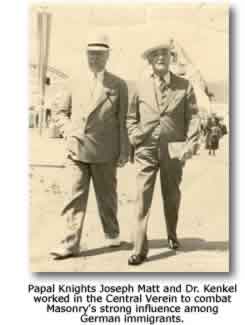 His long career was coming to a close at the time of the Second Vatican Council.
Mercifully, God took this loyal son to Himself before the horrors of Vatican II
had manifested themselves throughout the world. One who had so loyally and
competently served the Church and the great pre-Vatican II popes for close to 70
years could not easily have watched Modernism run roughshod over the Church from
within.
His long career was coming to a close at the time of the Second Vatican Council.
Mercifully, God took this loyal son to Himself before the horrors of Vatican II
had manifested themselves throughout the world. One who had so loyally and
competently served the Church and the great pre-Vatican II popes for close to 70
years could not easily have watched Modernism run roughshod over the Church from
within.
He used one of his final editorials in
The Wanderer to announce his
successor—his youngest son, Walter Leo Matt, the then assistant editor of
The
Wanderer, who after having returned from the war, had helped his father triple
the size of
The Wanderer’s subscriber base. Joseph chose to make his
announcement directly in the columns of
The Wanderer so that, as he explained at
the time, there would be no question as to his choice of successor. He chose
Walter to carry on the Matt Family’s fight for the Church, certain that Walter
would do so in the same spirit in which he himself had waged it for almost seven
decades.
Joseph Matt died in 1966.
Walter L. Matt
1915-2002
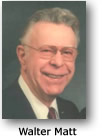 Walter Matt was born in 1915 in St. Paul, Minnesota. He was educated at St.
Agnes Catholic School, St. Thomas Military Academy and St. Thomas University. He
was a decorated veteran of World War II, having served with the U.S. Armed
Forces (in the Middle East, Africa, Italy) from June 1942 until May 1945. He
worked as a German translator and was awarded the Army Bronze Star for his work
with U.S. Intelligence and Army Public Relations during the war. He moonlighted
as a foreign correspondent for
The Wanderer throughout the war years.
Walter Matt was born in 1915 in St. Paul, Minnesota. He was educated at St.
Agnes Catholic School, St. Thomas Military Academy and St. Thomas University. He
was a decorated veteran of World War II, having served with the U.S. Armed
Forces (in the Middle East, Africa, Italy) from June 1942 until May 1945. He
worked as a German translator and was awarded the Army Bronze Star for his work
with U.S. Intelligence and Army Public Relations during the war. He moonlighted
as a foreign correspondent for
The Wanderer throughout the war years.
In 1964, his father, Joseph Matt, announced in
The Wanderer that Walter Matt was
to succeed him:
In June 1899, I became editor of
The Wanderer.... After sixty-six years of
uninterrupted service, I decided last summer that the state of my health
warranted at least a partial retirement. The question of a successor offered no
problem. My three sons have been my loyal co-workers for many years. Walter, my
successor as editor, was a part-time worker even as a student at the College of
St. Thomas and entered
The Wanderer as an editorial assistant after his
graduation from St. Thomas in 1938. In the Second World War, he spent almost
three years in Palestine, Egypt, North Africa and Italy, where he was awarded
the Bronze Star for distinguished service. He is well-informed, has a good
knowledge of the German language, and is a conscientious journalist. He is
married and the father of six children.
In 1965, however, the Second Vatican Council ended and, just as it had begun to
spread division throughout the whole world, it successfully divided the Matt
family very soon thereafter. Viewing the Council and the prospect of a New Mass
as developments which would prove disastrous for the Church, he left
The
Wanderer in 1967 and immediately founded
The Remnant. At that time, he had seven
children.
Thus was founded what was to become the uncontested flagship of the traditional
Catholic movement in the United States. The dispute with his brother, Alphonse
Matt, had been one rooted in the radical changes brought on by Vatican II,
changes which set brother against brother, parent against child, Catholic
journalist against Catholic journalist.
 Walter Matt’s strong stand against the
New Mass was shared but not by many. Men such as Dietrich von Hildebrand quickly
allied themselves with Walter Matt and his fledgling Remnant as they all sought
to establish a Catholic counterrevolution.
Walter Matt’s strong stand against the
New Mass was shared but not by many. Men such as Dietrich von Hildebrand quickly
allied themselves with Walter Matt and his fledgling Remnant as they all sought
to establish a Catholic counterrevolution.
In a letter dated April 27, 1970, von
Hildebrand wrote a letter to Walter Matt’s brother, the new editor of
The
Wanderer, summing up, in effect, the meat of the matter that had separated the
two Matt brothers. Von Hildebrand wrote:
 Dear Mr. Alphonse Matt:
Dear Mr. Alphonse Matt:
I thank you very much for your kind letter. But I believe that there is some
misunderstanding. You assume that the new ordo missae and especially the rubrics
constitute for me merely a personally painful change by replacing something very
beautiful and perfect with something less beautiful and less perfect. But
unfortunately it is my conviction that the new ordo missae is the greatest
pastoral mistake and that its consequences for the Church may be disastrous.
I agree however completely with you that it is a grave problem, whether one
should criticize it publicly or only intra muros. Concerning this problem every
one must follow his conscience. But I frankly cannot understand that you do not
only abstain from a public criticism of the new ordo missae but make the
“Wanderer” an instrument for propagating and praising the new ordo. You even
suggest in your letter, dear Mr. Matt, that I should join this propaganda. As
you say that you agreed with my article in “Triumph” in which I stress that
obedience to practical decisions of the Pope does not imply approval of them –
it is difficult for me to understand why you expect me to utter a univocal
approval of something which seems to be, from the purely religious point of
view, a “suicidal” practical decision. I do not believe that a mere loyalty to
the present Pope who does not act against those who destroy the Catholic faith daily
more and more – like Kueng, Schillebecks, Padovano, Greeley and many others –
and who does not use the means by which the Church survived through 2000 years:
anathema and excommunication – can preserve Catholic faith untarnished.
Dear Mr. Matt, it is painful for me to disagree with you because of my sincere
admiration for the “Wanderer” throughout the past years and our warm personal
union in Christ. This disagreement, however should in no way affect our friendly
relations.
Faithfully yours in Christ
Dietrich von Hildebrand
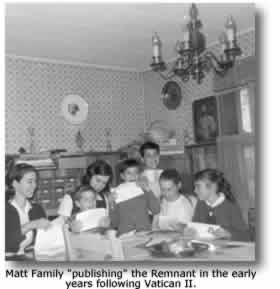 Such was the legacy of the Revolution of Vatican II…good men were pitted against
each other because of it, and confusion reigned. And, in such a climate, Walter
Matt went to work for the Catholic restoration through his Remnant. For the
first few years, before
The Remnant Press had been established,
The Remnant was
published literally out of Mr. Matt’s dining room, often collated and addressed
by his own friends and even his children.
Such was the legacy of the Revolution of Vatican II…good men were pitted against
each other because of it, and confusion reigned. And, in such a climate, Walter
Matt went to work for the Catholic restoration through his Remnant. For the
first few years, before
The Remnant Press had been established,
The Remnant was
published literally out of Mr. Matt’s dining room, often collated and addressed
by his own friends and even his children.
In 1972, his good friend, Father Harry Marchosky, introduced him to a promising
young Welsh writer from London by the name of
Michael Davies. Those Americans
who’ve benefited over the years from the excellent books and articles written by
Mr. Davies have Mr. Matt to thank for it, as, in 1972, he introduced American
Catholic readers to Mr. Davies through his fledgling
Remnant and maintained an
alliance with him for the next thirty years.
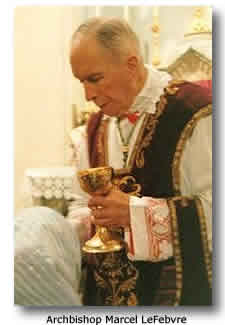 In 1976, Walter Matt received a letter from a certain French archbishop who was
making headlines throughout the world for standing against the Council and the
New Mass. The archbishop asked to publicly meet with
The Remnant’s team here in
St. Paul. Mr. Matt enthusiastically agreed, and proceeded to arrange that
historic meeting.
In 1976, Walter Matt received a letter from a certain French archbishop who was
making headlines throughout the world for standing against the Council and the
New Mass. The archbishop asked to publicly meet with
The Remnant’s team here in
St. Paul. Mr. Matt enthusiastically agreed, and proceeded to arrange that
historic meeting.
The archbishop’s name, of course, was
Marcel Lefebvre, and Mr.
Matt used the occasion to more widely introduce American Catholics to the heroic
churchman and his apostolate. He supported Monsignor Lefebvre at a time when it
was anything but popular to do so.
Thus, the Archbishop’s 1988 episcopal consecrations of four bishops against the
Pope’s will were a source of great pain for Mr. Matt. He feared that the
consecrations could mark the beginning of the establishment of the
petite eglise
(the little church existing outside the Roman Catholic Church) and so put
distance between himself and Econe (the headquarters of the SSPX in those days).
Then came the momentous event that changed everything. On January 18, 1991,
Bishop Joseph Ferrario, then Bishop of Honolulu, served a group of traditional
Catholics—the so-called “Hawaii Six”—in his diocese with a Formal Canonical
Warning, threatening them with excommunication for “formal adherence” to a
schismatic sect—namely the SSPX. Very soon thereafter, these traditional
Catholics were declared excommunicated:
"Whereas you performed," Bishop Ferrario
said, "a schismatic act, not only by procuring the services" of Bishop
Williamson to perform Confirmations at Our Lady of Fatima Chapel, "but also by
that very association with the aforementioned bishop (you) incurred ipso facto
the grave censure of excommunication.”
The Bishop of Honolulu seemed to be
acting in accord with the penalties allowed in Pope John Paul’s motu proprio
Ecclesia Dei itself, and so this was destined to become the great test case of
the Lefebvre “schism”.
But when the “Hawaii Six”—led by the late Patricia
Morley—took their case to Rome, they received a favorable ruling from Cardinal Ratzinger himself in a letter written on June 28, 1993, which concluded:
"From
the examination of the case, conducted on the basis of the Law of the Church, it
did not result that the facts referred to in the above-mentioned decree are
formal schismatic acts in the strict sense, as they do not constitute the
offense of schism; and therefore the Congregation holds that the Decree of May
1, 1991 lacks foundation and hence validity."
In other words, the excommunication handed down by Bishop Ferrario to the
followers of Archbishop Lefebvre was, in fact, non-existent, and the SSPX was
evidently considered by Rome to be neither schismatic nor excommunicated. This
entire development was covered in minute detail at the time by Michael Davies in
the pages of
The Remnant.
 The
precedent had been set, and the so-called “schism” of Archbishop Lefebvre had
been tossed on its head.
The
precedent had been set, and the so-called “schism” of Archbishop Lefebvre had
been tossed on its head.
While the debate still raged, it became clear that this was,
in fact, an in-house dispute between the Vatican and the SSPX, and that Rome,
according to Cardinal Ratzinger himself, viewed the SSPX, not as a formally
schismatic group (as they clearly recognized the authority of Pope John Paul and
prayed for the local ordinaries in the diocese in which they’d set up their
chapels), but rather as an “independent” priestly fraternity that, because of a
theological dispute over the revolutionary nature of the changes brought on by
Vatican II, was operating under an “irregular status” vis-à-vis the Vatican.
Traditionalists owe Cardinal Ratzinger a great debt of
gratitude for ending a “schism” that threatened to run right down the middle of
the worldwide traditionalist movement; and The Remnant thanked the Cardinal at
the time for setting the record straight.
 The
incomparable Solange Hertz worked
The
incomparable Solange Hertz worked
with Walter Matt throughout the 1990's
Since that time,
The Remnant has worked to encourage all traditional
Catholics—both "approved" and "unapproved"—to work as the “loyal resistance”—that
is, loyal to Peter but in adamant resistance to the revolution of Vatican II.
Over the years, Walter Matt’s Remnant collaborated with and supported such
notable organizations and individuals as Hamish Fraser, Dietrich von Hildebrand,
the priestly Fraternity of St. Peter, Bishops Williamson and Fellay, as well as
many priests of the SSPX, the Institute of Christ the King, Solange Hertz,
Father Vincent Miceli, Notre Dame de Chretiente, Action, Familiale et Scholaire,
Approaches, Apropos, Catholic Family News, The Latin Mass magazine, the Fatima
Crusader, the Angelus, Una Voce, Father Marchosky, Father Urban Snyder, Father
Lawrence Brey, Father Vincent Schneider, Dr. William Marra, the Roman Forum,
Arnaud de Lassus, Neil McCaffrey, Malachi Martin and so many respected writers,
journalists, priestly fraternities, magazines and priests who saw the
introduction of the New Mass as a great pastoral mistake and a calamitous event
in the Catholic Church!
Hamish Fraser (wearing
glasses), Michael Davies
and Walter Matt
at The Remnant's 10th Anniversary, 1977
 Through the combined efforts of so many traditionalist magazines, priestly
fraternities, publishers, and individuals, the worldwide traditional Catholic
movement was on the move, and pioneers such as Walter Matt were no longer alone.
Through the combined efforts of so many traditionalist magazines, priestly
fraternities, publishers, and individuals, the worldwide traditional Catholic
movement was on the move, and pioneers such as Walter Matt were no longer alone.
Though in the early years they had been derided and ridiculed by their
co-religionists who were all very excited about the New Mass and the new
“springtime of Vatican II",
The Remnant forged ahead in the fight for the
restoration of the old Tridentine Latin Mass and against the “spirit of Vatican
II” and all that that entailed.
Even though in the early 1970s, their cause had
been declared dead and buried while they themselves were forced to endure ugly
slurs such as “schismatic” and “renegade” by the “conservative” Catholic press,
their fight against the New Mass was vindicated in 1984 and then again in 1988,
when Pope John Paul II partially restored the Latin Mass throughout the world.
Thanks to Walter Matt’s personal visits to and endless pleading with Archbishop
John R. Roach of the St. Paul/Minneapolis Archdiocese, St. Paul was one of the
first dioceses in the world to restore the old Mass on a permanent basis. The
year was 1984.
A young Michael Davies at The
Remnant's
10th Anniversary in St. Paul, 1977
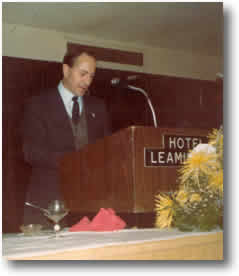 Never
falling victim to the so-called “Indult Mentality”, however, whereby traditional
Catholics are expected to succumb to quietism in exchange for permission to have
the old Mass (the so-called “Indult Mass”) Walter Matt refused to, as Abbé de
Nantes had put it, “swallow the Council in exchange for the Mass.”
Never
falling victim to the so-called “Indult Mentality”, however, whereby traditional
Catholics are expected to succumb to quietism in exchange for permission to have
the old Mass (the so-called “Indult Mass”) Walter Matt refused to, as Abbé de
Nantes had put it, “swallow the Council in exchange for the Mass.”
Instead, over the years since 1988 The Remnant became more
outspoken than ever against the “regime of novelty”—consistently opposing the
liturgical abominations, the Assisi-style prayer meeting scandals, sex education
in Catholic schools, papal permission for altar girls, the Pope’s sell-out to
the Jews, his scandalous apologizing for all things Catholic, his kissing of a
copy of the Koran, being entertained by the likes of Bob Dylan, allowing
Communion in the hand, the breakdown of Catholic schools, the scandals that is
Catholic seminaries, the ecclesial cover-ups of pedophile priests, etc., etc.
The fight continued, but at least the Mass was back and a
traditional Catholic counterrevolution was in full swing. And through it all,
Walter Matt never doubted that, had Archbishop Lefebvre not acted as he did, the
advances made with respect to the return of the Tridentine Mass would not have
come about so quickly, if at all.
For his part, Mr. Matt took advantage of the Indult (saying
at the time that he would “ride the train” as long as he could without
compromising his opposition to the Revolution), having refused to ever sign any
statement proclaiming any position regarding the validity of the New Mass or the
legitimacy of the changes of Vatican II in exchange for that indult.
In any event, Traditional Catholics were completely vindicated and, along the
way, Walter Matt had come to be regarded as the American pioneer of the
traditional Catholic movement, earning the praise of peers in many quarters.
For
example, in a personal letter dated January 31, 1976, Dietrich von Hildebrand
(who contributed occasionally to
The Remnant and whose work “Why the Tridentine
Mass” was published by Mr. Matt), addressed Mr. Matt as his “friend” and then
asked: “May I call you friend, though I never met you personally? But we agree
so thoroughly concerning the tragedy of the devastated vineyard and your
bi-weekly is a continuous joy and consolation for me.”
And, in another letter
written in 1989, the highly-regarded former associate editor of the
Denver
Catholic Register and the
National Catholic Register, Paul Hallett, wrote the
following to be read aloud at Mr. Matt’s 50th Jubilee celebration held in St.
Paul:
"I, like Walter Matt, observe my 50th year of service to the Apostolate of the
Catholic Press this year. I have known him personally and have shared in his
hospitality. For 30 years I have followed his writings in defense of Catholic
Faith and morals. With no one of them would I disagree in substance. They have
been marked by courage, consistency, clarity, knowledge, vigor and undeviating
loyalty to Catholic principles. Especially through his own paper,
The Remnant,
he has rendered a highly significant service to the Church in one of the most
crucial eras of her history."
 Shortly after the promulgation of the motu proprio Ecclesia Dei, through which
the Traditional Latin Mass was restored, the late great Fr. Vincent Miceli
called Mr. Matt a “titan of the Church”:
Shortly after the promulgation of the motu proprio Ecclesia Dei, through which
the Traditional Latin Mass was restored, the late great Fr. Vincent Miceli
called Mr. Matt a “titan of the Church”:
"When you get a chance, please give me a call—to tell me what it feels like to
have the Pope agree with you about the Traditional Mass. It has been a joy
working with you over the years, and an honor to have my articles published by a
titan of the Church."
And, again on the occasion of Walter Matt’s 50th anniversary in the Catholic
Press Apostolate, the great Dr. Eric de Savanthem (founding President of the
International Una Voce Federation) wrote the following:
"It was Walter Matt’s unswerving dedication to the fullness of the Catholic Faith
and to the Roman Church as its God-given guardian, that decided him to found The
Remnant, recently come of age. Walter raised his “kitchen-sink” newssheet to its
present important position in the sadly depleted world of authentically Catholic
media. Through
The Remnant Walter Matt has provided countless thousands with
regular spiritual nourishment and with reliable information on Church affairs.
To very many he has, moreover, given invaluable help by his always balanced
comment and guidance on the many critical issued facing all of us today. For
these outstanding and rare benefits, we all owe him an immense debt of
gratitude.
"Furthermore—and this is perhaps
The Remnant’s most distinctive flavor—Walter
Matt has created among its readers a genuine “family”-feeling, thus alleviating
the sense of isolation by which so many loyal Catholics are oppressed today. My
wife and I feel sure that to a great number, Walter has become a revered
“father-figure”, greatly admired and loved…"
And on the same occasion, the late, great Dr. William Marra wrote:
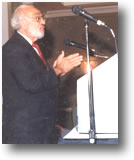 "When all other Catholic voices were silent, at least in the world of journalism,
Walter Matt was there, defending Catholic tradition. I never thought I’d be
speaking approvingly of—dare I say the phrase?—“the winds of change,” but aren’t
the winds of change beginning to move through the Church? Ain't it nice to have
the Old Mass back—or at least, on the way back? Thank you, Walter, from the
bottom of my heart, for helping make this possible."
"When all other Catholic voices were silent, at least in the world of journalism,
Walter Matt was there, defending Catholic tradition. I never thought I’d be
speaking approvingly of—dare I say the phrase?—“the winds of change,” but aren’t
the winds of change beginning to move through the Church? Ain't it nice to have
the Old Mass back—or at least, on the way back? Thank you, Walter, from the
bottom of my heart, for helping make this possible."
Dr. Marra,
The Remnant’s
30th Anniversary, October 17, 1997
The Conservative Book Club’s President Neil McCaffrey’s summary of the work of
The Remnant’s editor speaks to the high regard in which American traditionalists
held Walter Matt. In 1989 letter, the late Mr. McCaffrey wrote:
"When darkness descended on the Church back in the middle Sixties, Walter Matt
lit a candle for the remnant. With nothing in the way of resources to draw on,
he began publishing anyway, a living demonstration of the three theological
virtues and one of the cardinal virtues, fortitude.
"For over two decades now, Walter Matt and
The Remnant have given us the best
record in the English-speaking world of the fight to keep our Catholic
traditions alive: indeed, the only complete record. Month after month he
provided the principal forum for the ablest reporter and commentator on the
traditional scene, Michael Davies. When historians of tomorrow seek to record
the desperate rearguard struggle of Catholic traditionalists during these grey
decades, they will need a complete file of
The Remnant. And, remarkably, that is
all they will need. What an achievement for one man and his family, operating on
a prayer and a shoestring!
We can never repay him. Fortunately, there is a world beyond this one where
rewards are handled."
And, upon the occasion of his death, Michael Davies paid Walter Matt perhaps the
highest compliment when he admitted that being a part of
The Remnant editor’s
team had given him more “satisfaction than any other aspect of my life.”
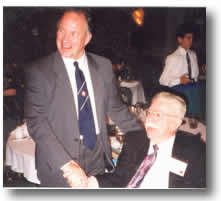 In a
letter dated April 27, 2002, Mr. Davies writes: "Walter’s entire life as a journalist was a fight, a fight for authentic
Catholicism, above all in the disastrous period following Vatican II. The fact
that there is now an effective resistance to the omni-present neo-Modernism
throughout the English-speaking world is, I would say, due more to him than to
any other individual with the possible exception of his friend Hamish Fraser.
The fact that I was, in my own small way, able to assist these two great men in
the fight for the truth gives me more satisfaction than any other aspect of my
life."
In a
letter dated April 27, 2002, Mr. Davies writes: "Walter’s entire life as a journalist was a fight, a fight for authentic
Catholicism, above all in the disastrous period following Vatican II. The fact
that there is now an effective resistance to the omni-present neo-Modernism
throughout the English-speaking world is, I would say, due more to him than to
any other individual with the possible exception of his friend Hamish Fraser.
The fact that I was, in my own small way, able to assist these two great men in
the fight for the truth gives me more satisfaction than any other aspect of my
life."
At a Remnant Forum in 1997, Michael Davies and
Walter Matt celebrated
25 years working together.
Mr. Matt used to refer to himself as a “pick and shovel” editor. He didn’t
reinvent the wheel. He just chained himself to the traditional Catholic Faith
and never let go. He was a journalist whose every line demonstrated that he was
a Catholic who lived in the world but was not of it. He didn’t care what the
world thought of him; he only cared what God thought. He was a man who, as he
used to say, “called a spade a spade no matter who was using it to bury God.”
In 1947, Walter Matt wrote an editorial in
The
Wanderer which is in some ways quite prophetic and which utterly
dispels the myth that all traditional Catholics believe Utopia reigned before
Vatican II:
"The era of the
Antichrist is upon us. The Devil, who is the ‘Prince of this world,’ has been
let loose on the blind and stumbling masses, and he is telling them that there
is no God and thus no Ten Commandment, no sin, no Judgment, no Heaven nor Hell.
He promises instead a paradise on earth, and his motto is: Eat, drink and be
merry, for tomorrow we die! And the horror is that in many nations today the
masses are being deceived by him.
Naturally, you
do not, therefore, fear for the Church, against which the gates of Hell shall
ne’er prevail. Rather, as Bishop Sheen has put it, it is for the world and for
immortal souls you fear. You tremble not that God may be dethroned, but that
barbarism may reign…And it is with these anxieties that all right-minded men
must be filled, rather than brood and despair."
Walter Matt was indeed a “right-minded man” who established
an island citadel of thought and ideals, which, through it be small, has stood
fast with similar islands the world over, where valiant men kept alive the flame
of the old Faith.
After some 60 years in harness in the Catholic Press
Apostolate, Walter Matt died peacefully on April 21, 2002. He died shortly after
receiving Extreme Unction from the hand of a traditionalist priest. At the
moment of his last breath, he was wearing his scapular, holding his rosary and
the hand of his wife of almost 50 years; his nine children and 35 grandchildren
were at his side. He was 87 years old.
Michael J. Matt
The current editor of
The Remnant is Walter Matt’s youngest son, Michael.
Michael Matt was born in 1966. He was educated at St. Agnes Catholic School,
Holy Childhood, St. Michael’s Academy, Hamline University, St. Thomas University
and Christendom College.
After graduating from Christendom in 1990, he returned to St. Paul to become
associate editor of
The Remnant, working closely with his father before and
after assuming editorship in 1994. He continued to be guided by his father’s
wisdom and experience until he died in 2002.
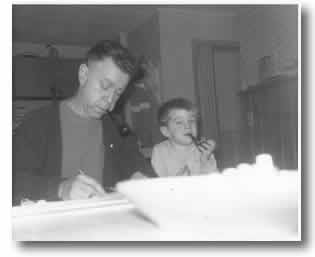 Today Michael Matt carries on the journalistic tradition of the Matt Family,
handed down to him by his great-grandfather, grandfather and father. The
Catholic Press Apostolate’s battle against the world, the flesh and the Devil,
in the name of Catholic truth and tradition, continues....
Today Michael Matt carries on the journalistic tradition of the Matt Family,
handed down to him by his great-grandfather, grandfather and father. The
Catholic Press Apostolate’s battle against the world, the flesh and the Devil,
in the name of Catholic truth and tradition, continues....
Walter Matt with son Michael,
“having a pipe”
and working on
The Remnant…a long time ago.
